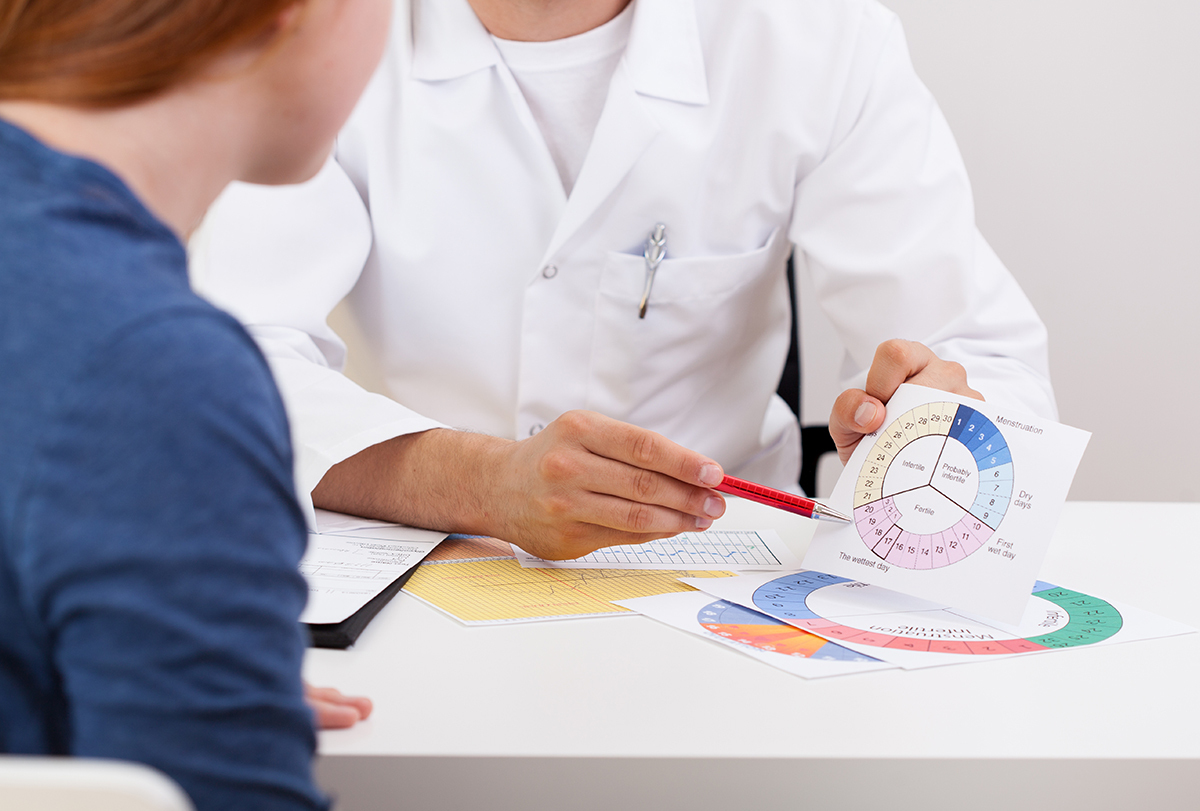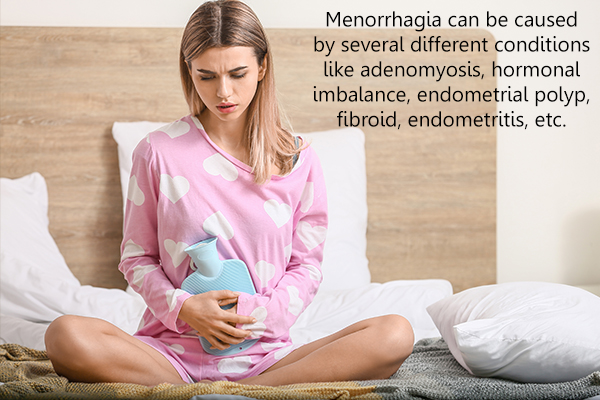In this article:
Menorrhagia is the medical term for abnormally heavy or prolonged bleeding during your menstrual cycle. (1)

Female hormones fluctuate during the month according to the phase of the menstrual cycle, and every woman’s cycle is unique. Despite differences between women, the normal menstrual cycle has three distinct phases:
- Follicular phase: The egg is maturing, getting ready to be released.
- Ovulatory phase: The egg is released.
- Luteal phase: If the egg is not fertilized after its release, hormone levels decrease and the menstrual cycle starts again. (2)
The menstrual cycle is numbered in successive days. Day 1 is the first day of your period; the remaining days follow after. You may notice changes to your body on certain days, such as breast tenderness and vaginal discharge. These are influenced by fluctuations in your hormones.
When seeing your healthcare provider for problems with bleeding or your menstrual cycle, they will ask about symptoms, bleeding characteristics, and what you are feeling during the different parts of the month.
It is helpful to use a calendar or an app to track your cycle and learn about your particular symptoms.
Causes of Menorrhagia

Menorrhagia can be caused by several different conditions:
- Adenomyosis: A condition where the lining of the uterus breaks through the muscular wall of the uterus, causing pain and heavy periods.
- Hormonal imbalance: Alterations in the normal levels of estrogen and progesterone.
- Endometrial polyp: A noncancerous growth attached to the inner lining of the uterus.
- Fibroid: A noncancerous growth that is sometimes found inside the uterus, within the wall of the uterus, or outside the wall of the uterus.
- Endometritis: An inflammation of the lining of the uterus caused by an infection.
- Pregnancy problems: Miscarriage, ectopic pregnancy, and other problems during pregnancy.
- IUD use: Certain IUDs can cause heavy periods.
- Bleeding disorders: Abnormal blood clotting can cause the menstrual period to be excessively heavy.
- Cancer: Although rare, abnormal bleeding can be caused by uterine cancer.
- Unknown: Often, the causes of heavy bleeding are not attributable to a specific condition. Many women experience heavy bleeding after childbirth, which may worsen with subsequent pregnancies but are not related to a structural or hormonal change.
Signs and Symptoms of Menorrhagia
The term “heavy bleeding” is somewhat subjective, but women experiencing menorrhagia often need to change their pad or tampon every 1–2 hours because it is soaked, or they bleed longer than 7 days. Those suffering from this condition often feel like their menstrual cycle greatly affects their quality of life.
In many women, heavy bleeding affects their choice of clothing due to fear of leaking, and some are even unable to leave the house during their period.
Treatment for Menorrhagia

There are several ways to treat menorrhagia, ranging from low intervention to surgical approaches.
Nonsteroidal anti-inflammatory medications such as ibuprofen or aspirin can help with cramping and reduce bleeding. Adding supplemental iron to your diet may reduce the anemia associated with heavy bleeding.
Your healthcare provider may suggest hormonal medication such as birth control pills or an intrauterine device (IUD) to lessen the bleeding. (3)
Surgical procedures such as ablation (destruction of the uterine lining) or hysterectomy (permanent removal of the uterus) are suggested when other methods of control are not indicated or if future fertility is no longer desired.
Diagnosis of Menorrhagia
Your healthcare provider will ask you about your medical history and your periods. Common questions include:
- Have your periods always been heavy, or have they changed recently?
- How many pads or tampons do you go through on the heaviest day of your period?
- Do you have symptoms such as dizziness and fatigue?
Your provider will ask that you keep track of your menstrual cycle to help determine the duration of your cycles and if you have a normal or abnormal frequency. There are multiple apps that can help women to keep accurate track of these details.
Your healthcare provider may order several tests and procedures to determine the source of bleeding, including:
- Blood tests to check for anemia
- Pap smear to evaluate your cervix
- Ultrasound to check for fibroids or other structural problems inside the uterus
- Biopsy to examine a tissue sample from inside the uterus
- Hysteroscopy – A small scope is used to visualize the inside of the uterus for structural abnormalities and to take a sample of the lining.
- Dilation and curettage (D&C) – This procedure involves scraping the inside of the uterine cavity, removing tissue.
Self-Care Tips for Menstrual Health
It is tempting to fall into unhealthy choices when you are feeling irritable, bloated, or uncomfortable. However, focusing on your overall health during your period is beneficial.
Follow these tips:
- Make sure you are well rested.
- Stay active.
- Eat healthy foods and drink plenty of water.
- Take a warm bath or use a heating pad for cramps.
- Try aromatherapy to create a relaxing environment.
- Use an app to keep track of your cycle and symptoms.
Exercises to Improve Menstrual Health
Overall health is important for feeling your best, regardless of the timing of your menstrual cycle. Maintaining a healthy weight can greatly reduce your risk of developing medical conditions, such as polycystic ovary syndrome, that can affect your cycle and fertility.
During a menstrual cycle, many women feel fatigued. Gentle exercise such as walking or light weightlifting may be therapeutic in reducing cramps by releasing endorphins.
Foods That Are Good for Your Menstrual Health
If you are suffering from anemia caused by menorrhagia, you may feel fatigued. An iron-rich diet can help. Consume red meat, poultry, fish, fortified cereals, tofu, beans, lentils, and legumes.
Consumption of vitamin C with iron-rich foods can help your body to best absorb sources of iron. Great choices include citrus fruits, bell peppers, tomatoes, and leafy greens. Coffee and caffeinated teas, such as green and black tea, can decrease the amount of iron the body absorbs. Avoid these beverages.
Limiting salt intake during your period will help to decrease water retention and bloating. In addition, avoid fatty foods as they can increase prostaglandin production, making cramps worse.
Many women crave comfort foods while experiencing menstrual symptoms. Just make sure your meals are full of vegetables and fruit, whole grains, and legumes.
Can Menorrhagia Cause Infertility?
While heavy bleeding itself cannot cause infertility, the causes behind menorrhagia can. (4) Fibroids and polyps (depending on the location) and hormonal imbalances can make pregnancy difficult to achieve for some women.
Final Word
Menorrhagia refers to heavy or prolonged menstrual bleeding, which can be quite discomforting, but it is rarely a cause for concern.
Women who are prone to such abnormal periods may experience increased fatigue due to the blood loss as well as painful menstrual cramps, which can confine them to their homes and sometimes even to their bed.
For some women, these symptoms may be an occasional inconvenience, while others struggle with them every month. If you are bothered by your condition, speak to your doctor about it. Your doctor will help you get to the root of the problem and rule out any serious concerns.
Living with menorrhagia usually entails an overall healthy lifestyle, complete with regular physical activity, drinking plenty of water, and a well-balanced diet that focuses on foods rich in iron and calcium while limiting sugar, caffeine, salt, and fat. Staying fit and eating well are prerequisites for easing heavy period flow and avoiding other health risks associated with it, but your doctor may prescribe additional medications if needed.
- Was this article helpful?
- YES, THANKS!NOT REALLY


